
-
Source
Men’s Sheds bring older, isolated men together (United Kingdom of Great Britain and Northern Ireland)
Men’s Sheds Associations work in many countries to engage older, isolated men and connect them with their peers in order to improve their well-being. Broadly, they are a form of community-based mental health provision (although not presented as such) that taps into masculinity norms concerning pragmatism, work, homosociality (i.e. social interactions between men) and banter. Such initiatives characterize a shoulder-to-shoulder rather than face to-face approach, where men share their emotions indirectly in the context of performing an activity. The website states:
For a long time, research has shown the negative impact of loneliness and isolation on a person’s health and well-being. Recently we have seen more evidence come to light that shows loneliness and isolation can be as hazardous to our health as obesity and excessive smoking. Surveys from mental health charities are finding that millions of people report feeling lonely on a daily basis. Men’s Sheds are vital.
Men typically find it more difficult than women to build social connections and, unlike women of a similar age, fewer older men have networks of friends and rarely share personal concerns about health and other personal worries. For some men, but not all, retirement can feel like a loss of personal identity and purpose. Men’s Sheds can provide a place to meet like-minded people and have someone to share your worries with; have fun, share skills and knowledge; and gain a renewed sense of purpose and of belonging. As a by-product, they reduce isolation and feelings of loneliness, allow men to deal more easily with mental health challenges and remain independent; rebuild communities; and, in many cases, they save men’s lives.
Photo by Thomas Mellbye on Unsplash




